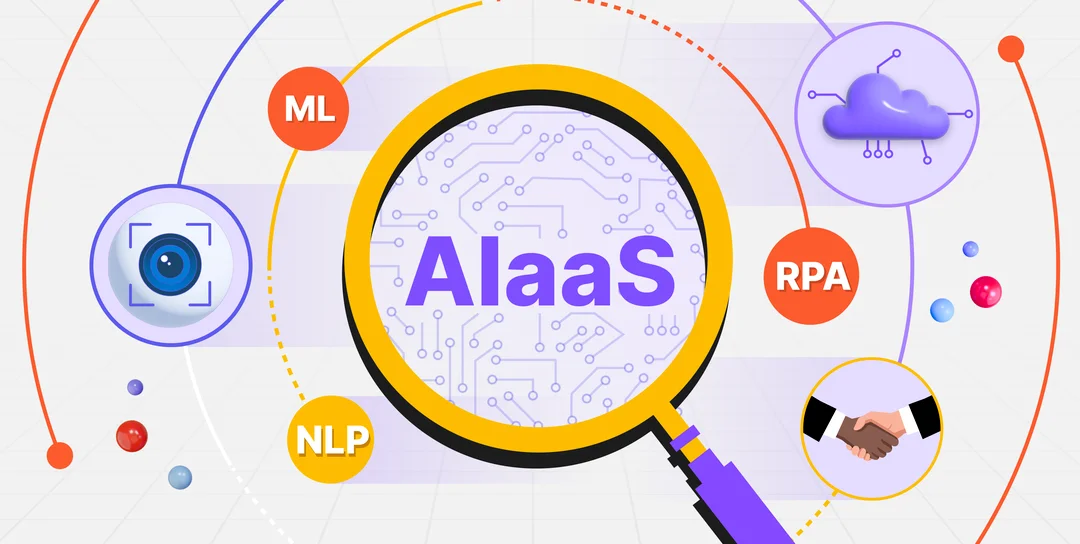What is AIaaS? A Guide to AI as a Service and How It's Used
• Customer Support
• FastBank

Ever felt like technology is moving too fast, and you're struggling to keep up? With AI as a Service (AIaaS), you can leap ahead without being left in the dust. Think of AIaaS as your personal shortcut to the latest in artificial intelligence without the hassle of installation or maintenance.
In this article, we'll break down how AIaaS can make high-tech solutions accessible and easy to use, helping you stay ahead and make smarter decisions.
What is AI As a Service?
AI as a Service (AIaaS) refers to cloud-based platforms that provide artificial intelligence capabilities to businesses and individuals without in-house expertise or infrastructure. This model allows companies to access and utilize AI technologies, such as machine learning, natural language processing, and data analytics, through a subscription or pay-as-you-go model. Essentially, AIaaS makes it easy for organizations to integrate sophisticated AI tools into their operations without the high costs and complexity of developing these technologies from scratch.
AIaaS vs SaaS
AIaaS (Artificial Intelligence as a Service) and SaaS (Software as a Service) are both cloud-based services, but they serve different purposes.
SaaS provides access to software applications over the internet, like email platforms or project management tools. With SaaS, you use software hosted by a provider or Cloud hosting alternatives, and you usually pay a subscription fee to use it..
On the other hand, AIaaS focuses specifically on providing artificial intelligence tools and capabilities. It means instead of just using standard software, you're accessing advanced AI features like machine learning models, natural language processing, or data analytics. AIaaS lets you integrate these smart tools into your existing systems to enhance their functionality without needing to develop or manage the AI technology yourself.
In short, SaaS is about accessing general software applications online, while AIaaS offers specialized AI tools and services that add intelligence and automation to your business processes.
Types of AIaaS
AIaaS comes in various types, each designed to tackle specific business challenges without the need for heavy technical expertise. Each type is crafted to help companies harness the power of AI with minimal setup, addressing common pain points with smart, scalable solutions. Now, let's dive into the four core types of AIaaS and their practical use cases.
Machine Learning (ML) as a Service
Machine learning as a Service (MLaaS) provides tools and frameworks that allow businesses to build, train, and deploy machine learning models. Instead of needing an in-house team of data scientists, businesses can use platforms like AWS SageMaker or Google AI Platform to analyze data, make predictions, or automate decisions.
Practical use: Retailers can use MLaaS to forecast inventory demand or recommend products based on customer preferences.
Natural Language Processing (NLP) as a Service
NLPaaS enables machines to understand and interact with human language. This service is ideal for companies that want to implement an AI chatbot, a voice assistant, or sentiment analysis without developing the underlying AI.
Practical use: A company can use NLPaaS to power a chatbot that handles customer inquiries or helps users navigate their website.
Computer Vision as a Service
Computer Vision as a Service provides tools for analyzing and interpreting visual data. It includes tasks like image recognition, facial recognition, and video analysis. Services such as Microsoft Azure Computer Vision make it easy to implement these advanced features in apps.
Practical use: eCommerce sites can use computer vision to automatically tag and categorize products based on uploaded images.
Robotic Process Automation (RPA) as a Service
RPAaaS helps businesses automate repetitive tasks by mimicking human actions. This type of AIaaS is popular for automating back-office functions like data entry, invoice processing, and basic customer support.
Practical use: An HR department might use RPAaaS to automatically process job applications and filter candidates based on preset criteria.
Benefits and Limitations of AIaaS
To utilize the full potential of AIaaS, companies need to be aware of both its perks and pitfalls. A closer look at the distinct benefits and limitations of AIaaS will help you navigate the intricacies of AI integration and ensure your strategies are effective and sustainable.
Benefits of AIaaS
Fast Deployment: AIaaS solutions can be implemented quickly, allowing businesses to start using AI tools almost immediately. This rapid deployment means companies can address challenges and capitalize on opportunities without lengthy development cycles, enabling faster innovation and responsiveness to market changes.
User-Friendly for Non-Experts: Many AIaaS platforms are designed with intuitive interfaces, making them accessible to users without deep technical expertise. It empowers a wider range of employees to leverage AI capabilities, reducing reliance on specialized teams and fostering a more data-driven culture across the organization.
Seamless Integration With Existing Tools: AIaaS offerings often come with features that allow them to integrate smoothly with commonly used business applications. This compatibility minimizes disruption during implementation and ensures that organizations can enhance their workflows without taking over their existing systems.
Limitations of AIaaS
Dependency on External Providers: Relying on third-party vendors for AI solutions means businesses can be affected by the provider's performance, service outages, or changes in pricing. This dependency can create vulnerabilities, particularly if a vendor's services do not align with the company's evolving needs or if they discontinue support.
Less Customization Options: While AIaaS provides ready-to-use tools, the level of customization may be limited compared to building an in-house solution. Businesses with specific requirements might find it challenging to tailor these services to fit their unique needs, which can lead to compromises in functionality.
Limited Control Over Data Management: Using AIaaS often means that sensitive data is stored and processed on external servers. It can raise concerns about data privacy and compliance, as businesses may have less control over how their data is managed and secured, potentially exposing them to risks and regulatory challenges.
Top Companies Offering AI As a Service
AI as a Service makes it easier for businesses to access powerful AI tools. Top companies in this space provide cloud-based solutions that help organizations integrate AI without large investments. Here's a look at the leading providers shaping this trend.
Open AI
Open AI provides high-end AI models like GPT for natural language processing and DALL-E for image generation, making advanced AI accessible via easy-to-integrate APIs. Developers can create sophisticated AI applications with minimal effort, leveraging OpenAI's powerful models for everything from chatbot development to creative content generation.
NVIDIA AI
NVIDIA AI offers a powerful suite of AI services built on its industry-leading Graphics Processing Units (GPUs), enabling advanced deep learning, machine learning, and data analytics. With solutions like NVIDIA's GPU Cloud and the Triton Inference Server, developers can train and deploy complex AI models at scale with high performance. NVIDIA AI is ideal for organizations that require computationally intensive tasks like real-time video analysis, natural language processing, and AI research.
IBM Watson Studio
IBM Watson Studio provides an integrated platform for data scientists, developers, and business analysts to build, train, and deploy AI and machine learning models. It offers tools for data preparation, model development, and collaboration, making it easier to turn raw data into actionable insights.
Google Cloud AI
Google Cloud AI delivers a comprehensive set of AI and machine learning tools, including Gemini, AutoML, TensorFlow, and Vertex AI. These tools allow developers to build and train custom models with minimal coding. With Google's vast cloud infrastructure, users can scale AI workloads and gain access to powerful analytics and machine learning services.
Microsoft Azure AI
Azure Machine Learning simplifies the creation and deployment of machine learning models, while Azure Bot Services enables the development of sophisticated conversational agents. With its deep integration into the Azure cloud ecosystem, Microsoft provides scalable, enterprise-grade AI solutions for various business needs.
Conclusion
Concluding our exploration of AI as a Service (AIaaS), it's evident that this model simplifies the adoption of advanced AI technologies, eliminating the typical deployment challenges.
So, moving forward, embrace AIaaS as the catalyst that brings your vision to life, keeping in mind that the true power of AI lies not only in the technology itself but in how you integrate it into your strategy for lasting impact.

























